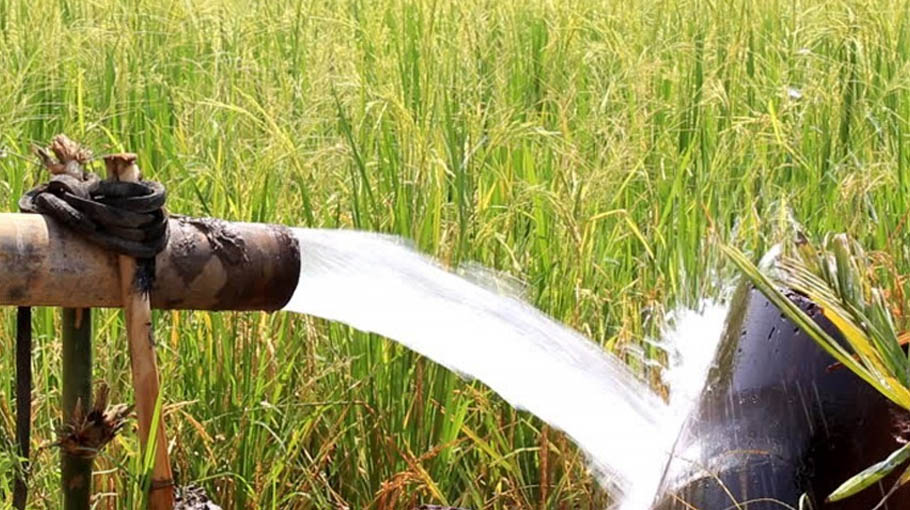BRRI reveals new facts on water usage in Boro cultivation
Only 1/5 of presumed water needed!

Boro paddy cultivation does not degrade the groundwater level. It was estimated that 1 kg of Boro paddy requires about 3000-5000 liters of irrigation water but research done by BRRI shows that farmers are successfully producing 1 kg of paddy with only 1000-1600 liters of irrigation water through controlled irrigation management of the country. This water requirement is even less considering irrigation only as approximately 40 percent (400-650 liters) ow tare in needed of which is mixed with groundwater through seepage and percolation. Thus the actual water required for paddy production is 550-650 liters/kg.
Agriculture Minister Dr Mohammad Abdur Razzaque MP joined as the chief guest in the webinar and said that the confusion about water wastage in Boro paddy, which was prevalent in the society, will be eradicated through the results of this research of BRRI and its affiliates. He said that all the concerned institutions including the Water Development Board should conduct research work simultaneously to resolve such confusion. Arranged by Commonwealth Scientific and Industrial Research Organization (CSIRO), University of Southern Queensland (USQ), ACAIR and Australian AID, the minister stated that. Agriculture Secretary Saidul Islam, executive chairman of the Bangladesh Agricultural Research Council Sheikh Md Bakhtiyar, Chairman of Bangladesh Agriculture Development Corporation AFM Hayatullah, Director General of Agriculture Extension Department Md Benazir Alam and Executive Director of Barind Multipurpose Development Authority Md Abdur Rashid joined the virtual programme via Zoom app.
Professor Emeritus and former Vice-Chancellor MA Sattar Mandal of Bangladesh Agricultural University and former director general of the Department of Agricultural Extension Hamidur Rahman were added to the expert panel. Bangladesh Rice Research Institute Irrigation and Water Management Department Chief Scientific Officer and Chief Dr Md Moniruzzaman and Principal Research Scientist of Commonwealth Scientific and Industrial Research Organization (CSIRO) Australia Md Main Uddin presented two articles in the webinar.
Professor Emeritus MA Sattar Mandal in the panel discussion said Boro paddy cultivation was not the only factor responsible for the declining groundwater level in the north-western part of the country. Due to low flow of water in rivers, canals and Beels in the northwest during the dry season, a portion of ground water is flowing into the river as base flow. As a result of groundwater abstraction, flood waters first fill in the gaps in the groundwater, thus reducing the intensity of the flood.
Former Director General of the Department of Agricultural Extension Hamidur Rahman said that in order to manage sustainable groundwater in the north-western part of the country, it is necessary to increase the use of surface water with integrated initiatives. Increasing the use of water conservation in rivers, canals and canals will enable successful cultivation of paddy and other crops in the north-western part of the country.
According to the two essayists in the workshop, the groundwater level in some parts of the north-west has been declining due to overuse of groundwater in agriculture. Over the past five years, CSIRO and the University of Southern Queensland (USQ) in Brie and Australia and ACIAR, Australia have carried out a number of studies aimed at improving the use of groundwater, the actual amount of water in rice production and low cost rice production technologies.
The results of these studies have shown that Boro area in the north-west of the country has not increased in the last 10 years, but Boro yields are increasing due to other reasons including improved varieties. Moreover, the use of high yielding varieties of Boro paddy and cropping pattern based crop cultivation can further increase the productivity of the land and use of crop water.
BRRI Director General Shahjahan Kabir in a statement said that the negative propaganda that the ground water level is going down due to the use of irrigation water in Boro paddy cultivation across the country is not correct. Underground aquifers act as water reservoirs. So there is no chance of being distracted by these negative propaganda.


